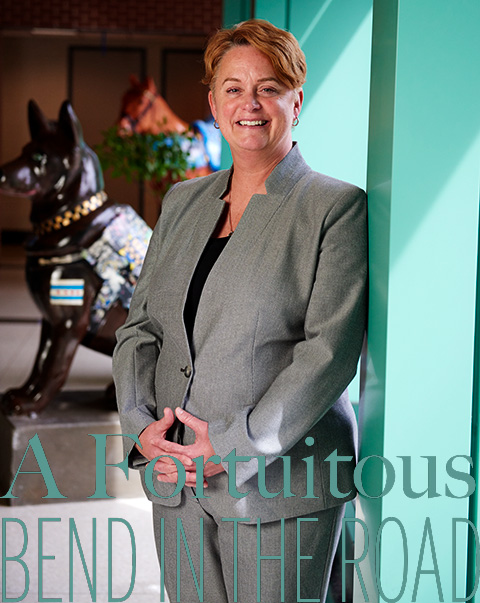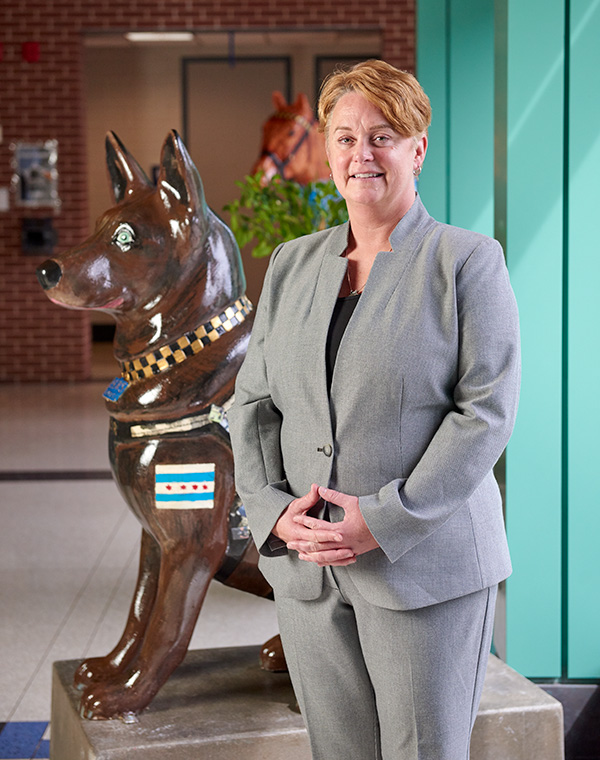
“This is not a typical journey that a patrol officer would take,” says Catherine Sanchez (M.P.A. ’17), a 13-year veteran of the Chicago Police Department (CPD).
Sanchez has blazed a trail at CPD by creating, and now piloting, a new crisis intervention model designed to reshape how Chicago police interact with people with mental illness by placing community outreach and treatment front and center.
“We want to increase public safety and reduce the demand on officers for crisis response,” she says, “especially for high utilizers of emergency services—people with mental illness that we’re taking to the hospital time and time again.”
“One of the biggest gifts I was given from my schooling was to ask the question: Just because it’s been done this way forever, is this the best way?”
Sanchez has traveled a winding path from her small-town roots in Michigan to Chicago’s streets. An interior designer for more than a decade, she changed course to enter the police academy, hoping to use her problem-solving skills as a detective. After a few years on the force, she felt the tug of the classroom and enrolled part-time in Illinois Institute of Technology’s Master of Public Administration program at Stuart School of Business.
In 2016 while in the final stretch of juggling school, work, and family to earn her degree, Sanchez was asked to join a police unit that was liaising with the United States Department of Justice investigation into CPD policies and procedures. At the time, she was looking for a topic for her master’s capstone project. Her job and studies aligned.
“One of the biggest gifts I was given from my schooling was to ask the question: Just because it’s been done this way forever, is this the best way?” she notes. “To ask, what can be improved upon, is there something missing?”

Crisis intervention strategies and models were on the rise, and Sanchez talked to people in police departments across the U.S. and Canada who had tried them. For her capstone project, she customized a model that centered on a mental health resource officer at the district level—an approach that hadn’t been tried in Chicago. The CPD adopted the model, and Sanchez started a pilot program to try it out in the 19th District on the city’s North Side.
The 19th District leads the city in the highest rate of mental health-related calls to first responders. Sanchez serves as a resource for officers who handle mental health crisis calls, going on calls herself when possible. She also scours the daily call reports to identify people who are frequently showing up in the mental health calls, and then works to connect them with local mental health care providers and social services for support.
“Every other day, it seems, I have meetings with [people and organizations in] the community,” Sanchez says. “Over the last year the relationships have changed 180 degrees, and that’s helped everybody. The community knows what they can expect from us, and we know what we can expect from them.”
Sanchez’s roll-up-her-sleeves approach and calmly energetic manner are among the keys to her effectiveness, according to Stacey Brown, a coordinator for behavioral health services at Advocate Illinois Masonic Medical Center in the 19th District.
“She’s very creative and finds very specific solutions for different people,” Brown says, recalling times when Sanchez has helped mental health caseworkers track down homeless people to administer medications or accompanied home visits to mentally ill clients who might become violent. “What makes her unique is that she’s got a lot of empathy, she’s really smart, and she thoroughly understands police culture.”
Initial reporting on the pilot program points to progress in reducing the mental health-related emergency calls involving people chronically in crisis. Listening to Sanchez, though, it’s clearly the individual stories behind the data that animate her daily work.
“The successes we’ve had are pretty cool,” she begins, before talking about one person who is now connected with services, is in treatment, and is no longer a regular in the daily reports.